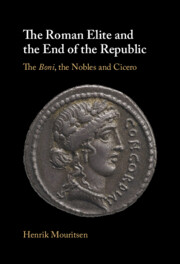Book contents
- The Roman Elite and the End of the Republic
- The Roman Elite and the End of the Republic
- Copyright page
- Contents
- Acknowledgements
- Introduction
- Part I The Boni in the Late Republic
- Part II Property and Politics
- Part III The Boni and the End of the Republic
- Chapter 13 Boni and Nobiles
- Chapter 14 The Power of the Nobiles
- Chapter 15 ‘Boni Non Sequentur’
- Chapter 16 Cicero and the Formation of an Alternative
- Chapter 17 Epilogue
- Appendices
- Bibliography
- Index
Chapter 16 - Cicero and the Formation of an Alternative
from Part III - The Boni and the End of the Republic
Published online by Cambridge University Press: 15 December 2022
- The Roman Elite and the End of the Republic
- The Roman Elite and the End of the Republic
- Copyright page
- Contents
- Acknowledgements
- Introduction
- Part I The Boni in the Late Republic
- Part II Property and Politics
- Part III The Boni and the End of the Republic
- Chapter 13 Boni and Nobiles
- Chapter 14 The Power of the Nobiles
- Chapter 15 ‘Boni Non Sequentur’
- Chapter 16 Cicero and the Formation of an Alternative
- Chapter 17 Epilogue
- Appendices
- Bibliography
- Index
Summary
It is not least Cicero’s final struggle in 44–3 that invites a revaluation of his place in the history of the late republic. During those crucial months he was the effective leader of the res publica, the treasured ideal which he had always claimed to personify, and which arguably vanished together with its last dedicated defender. As already noted, Cicero occupies a unique place in the history of this period, being our primary source as well as one of its leading protagonists. His dual role as actor and reporter – along with the sheer amount of evidence surviving from his hand – has paradoxical consequences, as it affects our ability to evaluate his historical significance objectively. One way of overcoming this problem it to reconsider the wider social landscape in which he operated, which in practice means looking beyond the narrow confines of the political class. This study has tried to draw attention to a hitherto unrecognised element of Rome’s social structure, the boni, who comprised the broader class of property owners that formed the backbone of the res publica. The simple fact that they far outnumbered the small circle of families who monopolised the highest offices automatically changes our understanding also of Cicero’s position in Roman politics.
- Type
- Chapter
- Information
- The Roman Elite and the End of the RepublicThe <i>Boni</i>, the Nobles and Cicero, pp. 269 - 282Publisher: Cambridge University PressPrint publication year: 2022

